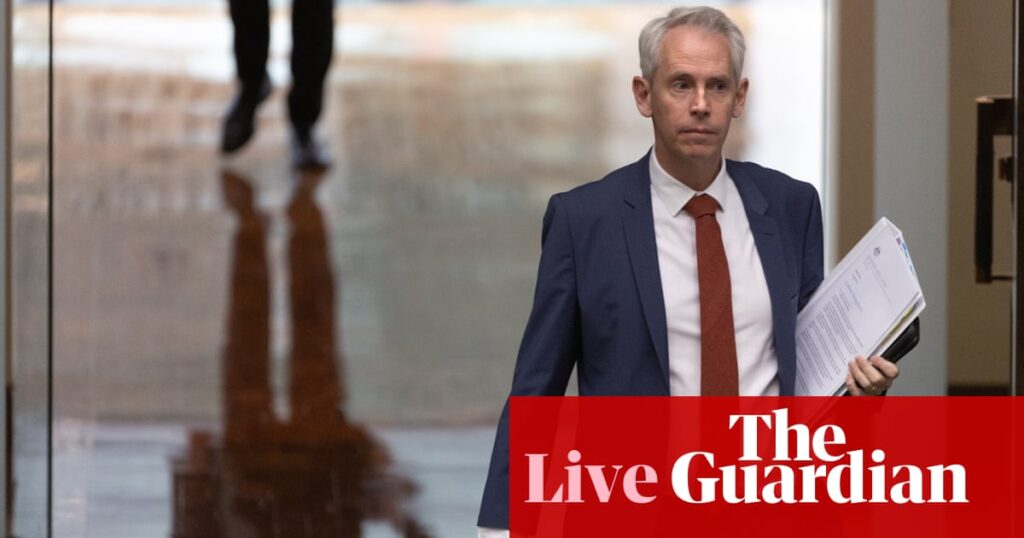Key events
Environment minister Murray Watt says there hasn’t yet been a deal reached on critical environment laws but the government is “a lot closer than we were and have been for many years”.
The government planned to reform the Environment Protection and Biodiversity Conservation (EPBC) act in the last parliamentary term – under then environment minister, Tanya Plibersek. But that deal was scuttled at the eleventh hour.
We have committed today to bring forward by several months the introduction of this legislation, we’ll be introducing it to the Parliament this side of Christmas, and we certainly will be seeking the support from both the coalition and the Greens to deliver these reforms.
A big sticking point for the Greens and some independents is a climate trigger – which would require the act to take into consideration the climate impact of a proposed project before approving it.
Watt says the government hasn’t “settled on a position” on that issue.
I would point out, Graham Samuel in his review [of the EPBC act] did not recommend a climate trigger. He expressly ruled that out. What he recommended is companies when they’re putting forward projects for approval, should disclose their emissions and what their plans are to reduce their emissions going forward.
Aukus ‘really critical for decades to come’, Rishworth says, despite US review
Aukus is still critical for Australia, cabinet minister Amanda Rishworth says, as the deputy prime minister, Richard Marles, meets with his defence counterpart in the US.
The US is currently reviewing the Aukus deal, with a report due by the end of the year.
Rishworth is on the Today show and says Marles is working “very hard” with his US counterpart, Pete Hegseth, and that there is bipartisan support for the security pact.
Our three countries – the US, UK and Australia – have been committed to this arrangement. It is really critical for decades to come.
Rishworth is joined by the Greens leader, Larissa Waters, who is far less enthusiastic about the pact. (The Greens have been highly critical of Aukus since its announcement).
This is a dog of a deal for submarines that we may never receive anyway. It’s costing us an absolute motza.
Good morning!
Krishani Dhanji here with you, thanks to Martin Farrer for getting us started.
Murray Watt is doing the media rounds this morning – he’s planning to put major environment reforms to parliament this year. (You can read more about the EPBC changes here).
The chambers will be sitting a bit later this morning, because we have party room meetings – where party leaders will give their colleagues a bit of a gee up and they’ll discuss what policies they want to put forward or support over the sitting fortnight.
It’s going to be a busy one, so let’s get going!
Tory Shepherd
Single Mother Families Australia calls for safety supplement for women who have experienced intimate partner violence
Single mothers are carrying “herculean” emotional and financial burdens that are even more intense if they have fled domestic violence, Single Mother Families Australia (SMFA) says.
A Swinburne University survey carried out for SMFA of 2,600 women found nearly seven in 10 had experienced intimate partner violence (IPV) and nearly one in five were currently experiencing it. Of those, about one in three were experiencing financial abuse or coercive control.
Almost four in five single mothers spend a lot or almost all of their time worrying about their family’s finances.
SMFA says mothers are not only managing their own recovery, they are also supporting children who were themselves victim/survivors, a burden of unpaid work that is “largely invisible to government policy and family violence services”.
SMFA is calling for measures including a $23,000 safety supplement paid in instalments via Family Tax Benefit A for women who have experienced IPV, a significant reform of the child support system, which allows perpetrators to continue abuse after separation, and an increase in the amount and duration of parenting payments.
One mother told the survey: “Fleeing domestic violence can leave you financially crippled, and systems can make it worse. It takes over a decade to build back up from nothing. Parents who care for children deserve a living wage and superannuation top-ups.”
David Pocock renews calls for sanctions against Israel
Senator David Pocock has renewed his call for sanctions against Israel after the country’s latest attack on a hospital, a “double tap” strike that our correspondent in the region says bears many of the hallmarks of a war crime.
Pocock wrote on X:
Attacking health infrastructure, killing journalists, starving children – how many more flagrant breaches of international law will governments tolerate before sanctioning PM Netanyahu and stopping trade with Israel?
MP with autistic daughter reveals fear over NDIS changes
As the Albanese government tries to curb the cost of the NDIS, a Coalition MP and father of an autistic child has spoken out about how he was in “two minds” about the reform, Australian Associated Press reports.
Parents reacted with shock when the federal government announced last week a new scheme called Thriving Kids to serve as a cheaper alternative to the $44bn NDIS.
Phil Thompson, the MP for Herbert, said “it pains me to my heart” that families feel like their children are an inconvenient dollar figure on a government’s budget bottom line.
I know that reform is needed. I get that. I understand it, but it must be done in a way where participants aren’t waking up in the morning finding out that things have changed.
The Coalition’s assistant NDIS spokesperson is the father of Emery, a five-year-old with autism.
“Changes that get made quickly, changes that get made without consultation or minimal consultation, terrifies me as a father, terrifies me for my daughter’s future,” Thompson said.
I’m not the only person in this parliament or this country that is looking at the changes to the NDIS with lots of fear.
The treasurer, Jim Chalmers, has warned the states and territories could lose billions of dollars in extra funding for hospitals over five years if they failed to back his government’s plan.
Thriving Kids will be rolled out from July 2026 and be fully implemented by July 2027.
Labor to invest $30m in trade skills teaching

Patrick Commins
The Albanese government will invest $30m to lift the number of electrical and construction teachers in the VET system, the minister for skills and training, Andrew Giles, says.
Giles, in a speech to be delivered to the National Press Club later today, will say that “equally valuing VET’ will be one of three priorities in this term of government.
“Nine out of 10 new jobs will require some form of tertiary education, approximately half VET and half higher education,” he will say.
“We will only achieve the national goal of four in five Australians holding a Tafe qualification or a university degree if we break down that artificial barrier between vocational and higher education.”
Giles will say another priority in this term of government will be promoting lifelong learning, a key area identified by participants at the recent economic reform roundtable.
“It’s the concept that knits together how we should be thinking about supporting people to navigate a changing world, on their terms.
“In the context of generative AI, and indeed more generally, we are witnessing changes in demand for skills and [we] should anticipate this accelerating.”
Welcome
Good morning and welcome to our live politics blog. I’m Martin Farrer with the best of the overnight stories before Krishani Dhanji takes the controls.
The skills minister, Andrew Giles, will tell the National Press Club today that the Albanese government is planning to invest $30m to lift the number of people who teach electrical and construction skills in the VET system. He will also flag the government’s plans to promote more lifelong learning. More details in a moment.
As the Albanese government tries to find ways to curb the cost of the $44bn-a-year NDIS, a Liberal politician and father of an autistic child said he was in “two minds” about the changes and that it “pains him that families feel their children are ‘inconvenient’”.

